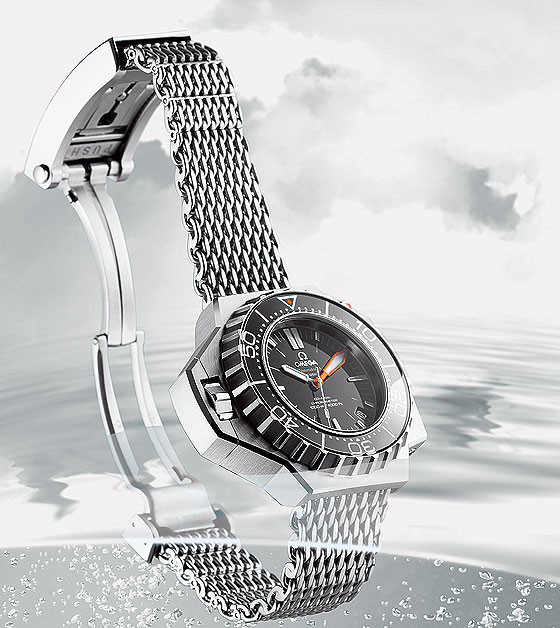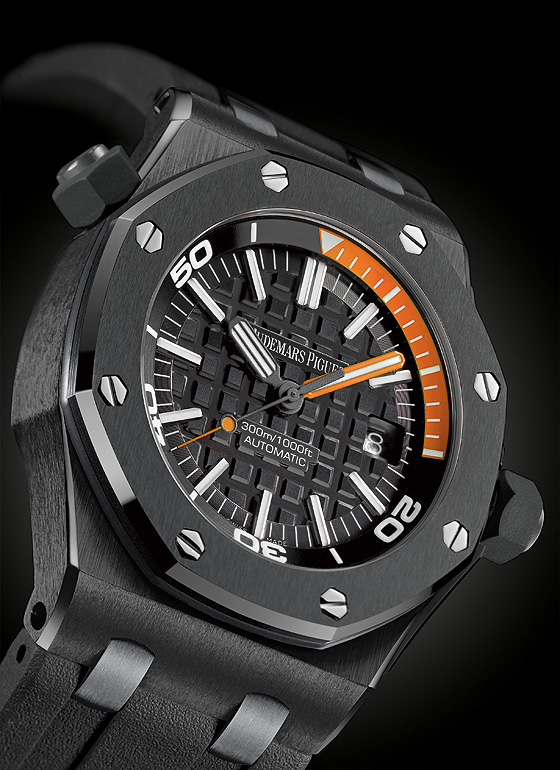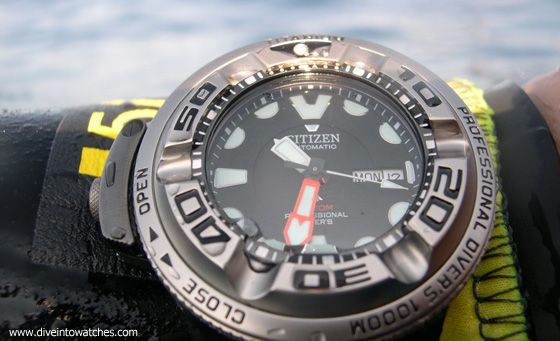Its function is actually quite simple: before a diver’s descent, the 12 o’clock bezel marker is aligned with the minute hand, allowing the elapsed time, up to 60 minutes, to be read on the bezel (which is why quite a few dive replica Breitling watches come with a particularly prominent minute hand). A unidirectional, ratcheting construction ensures that – if the bezel is accidentally moved – the time already spent underwater would be indicated as longer than actually spent, providing the diver with a safety reserve for his now more imminent ascent. The bezel/minute hand combination does not, however, directly measure how much air remains in the air tank, as still can be read quite often in press releases.
A standard scuba dive (in which the diver is equipped with a standard air tank) usually lasts 30 to 50 minutes, mostly depending on the depth reached and the shape the diver is in (basically, how physically demanding the dive is). This explains why the first 15 to 20 minutes on the bezel inlay are often more highlighted – the end of this sector theoretically indicates the point of return (exception: “countdown” bezels that mark the time of ascent). In order to correctly time decompression stops at the end of a dive, central-minutes chronographs such as the Aquastar Benthos or even split-minute chronographs, such as the IWC Aquatimer Chronograph from 2004, offer an interesting complication (should the diver not use a computer).

@www.cheapwatchesuk.me
But, back to the start of a dive: In reality, the bezel is aligned when the diver is geared up and ready to begin the dive — which is, most of the time, when he is already in the water or on a boat right before entering the water. It is rarely performed in a dry hotel room, wearing no gloves, when one is able to take off the watch to comfortably set its bezel. So, despite how much I personally love the Omega Ploprof (which features a bi-directional external bezel with a locking mechanism) and the Hublot Oceanographic 4000 (whose unidirectional internal bezel is operated via a screw-down crown which is then placed behind a protective cover), neither are among the easiest watches to be operated single-handedly when worn in the water. And I would strongly advise you never to remove a wet luxury Breitling replica watches from your wrist when there’s a bottomless pit below you.
From a construction point-of-view, there are two main approaches:
External bezel: first used for a dive watch by Rolex and Blancpain (inspired by earlier pilots’ watches) in 1953/54, this is still the simplest and most user-friendly approach. Disadvantages include wear from debris,sand or salt getting between the case and the bezel, and the possibility of accidentally moving or damaging the bezel.
As a solution to these issues, Citizen introduced a removable bezel with the Citizen Promaster 1000 in 2002, and IWC launched the Ocean 2000 in 1984, with a bezel that could only be operated counter-clockwise when pushed down (an idea re-introduced in 1998 with its GST Aquatimer). This concept was similarly executed earlier by Certina, with its DS-2 500m in 1968, and later in 2003 by TAG Heuer for the Aquagraph 2000 Chronograph (with a two part bezel) and by Oris in 2009 with the Oris Prodiver (whose bezel needed to be lifted). More or less complicated bezel locking mechanisms — as first introduced on the Omega Ploprof in 1970 and again in its modern version in 2009 — can also be found in the Hublot Subaquaneus, the Squale Tiger, some models from UTS, Germano, and Glycine, and, of course, in older Yema models.
Internal bezel: most likely introduced by Aquastar in the 1960s. In this construction, the bezel is located inside the Replica Breitling Super Ocean watches and is thus protected by the crystal, giving the watch a more elegant look. The bezel can only be operated with a (usually additional) crown, quite often in both directions (exceptions include the Audemars Piguet Royal Oak Offshore Diver, Hublot Oceanographic, etc.). Disadvantage: An additional opening in the case (except maybe for the first Aquastar models, and the recent Maurice Lacroix Pontos S, in which the chronograph pusher also operates the bezel) and often a rather small crown to fumble with. The more secure it is designed (unidirectional, screw-in), the less practical it becomes for diving.

In 2002, Eterna introduced, with its KonTiki Diver, an interesting first fusion of both concepts: the internal bezel could be operated from the outside, a concept that first allowed a water resistance of 200 meters and, in 2005, up to 1,000 meters with the more radical-looking Concept Diver.
In 2014, IWC went all the way and seems now to be offering, for the first time, the best of both worlds: The new IWC Aquatimer family features a new system (Safedive) that combines a unidirectional internal bezel that can only be rotated with a ratcheting external bezel (which can be moved in both directions, but only counter-clockwise for adjusting the internal bezel).
Find out more at www.cheapwatchesuk.me
